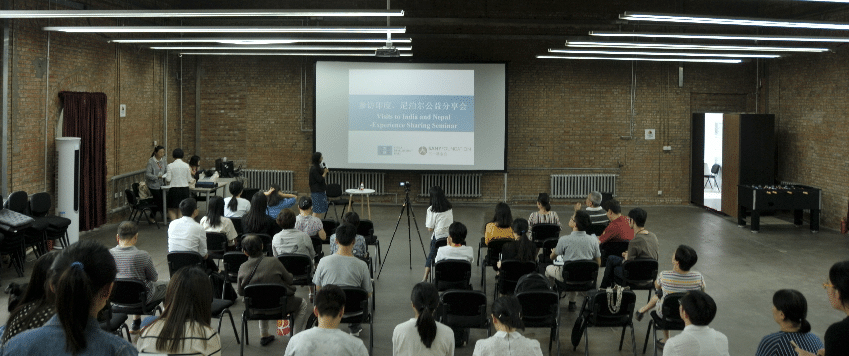A sharing session on Indian and Nepalese philanthropy was held in Beijing by China Development Brief (CDB) and the Beijing Sanyi Foundation in the 3ESPACE venue on June the 12th. Dr. Liu Haying, a senior researcher from CDB, presided the session, which was attended by nearly 40 people from NGOs, international organizations, foundations, and universities. Members of CDB who took part in the visit to India and Nepal organized by the NGO in March shared their experiences and their research on the topic.
Firstly, the consultant for the trip and secretary general of the Beijing Vantone Foundation, Chen Jian, broadly introduced the experiences of some of the CDB members who recently visited India and Nepal. She explained that grassroots NGOs’ capacity building was the main aim of the visit. She then listed three examples of representative institutions, starting with PRIA, which focuses on participation, including information sharing, capacity building, and knowledge transfer. The other two examples were the Credibility Alliance, a consortium of voluntary organizations committed to enhancing accountability and transparency in the Voluntary Sector through good governance, and Account Aid, which provides various services such as audits, consultancy, systems design advice and workshops exclusively to the non-profit sector.
Secondly, the executive director of CDB, Chen Yimei, introduced a representative institution – the Dasra Foundation. Dasra divides its project operations into three phases: knowledge production and sharing, grassroots institution capacity building and funding cooperation. When it comes to capacity building, Dasra selects some NGOs and social enterprises as their portfolio partners and provides technical help for them in at least ten aspects within 70-100 days. For funding cooperation, Dasra has established ecosystems each consisting of about ten philanthropists who not only provide funding but are also engaged in the field or institution they fund and analyze whether the funds will promote social development and how they can cooperate with other sponsors. Dasra has now established a five-year strategic program called The Girls Alliance for Strategic Philanthropy to address social problems collectively.
Next, CDB’s senior program and legal officer Wu Weiming introduced the outline of legal institutions concerning the NGO sectors in India and Nepal, especially the definitions, registration and policies for NGOs in the two countries. Vice director of CDB’s media and communications department Guo Ting spoke about Chinese NGOs going out and the development of Nepal’s international NGOs. Zou Zhiqiang, country director of China Foundation for Poverty Alleviation (CFPA) in Nepal, talked about CFPA’s disaster relief efforts around the world. CFPA was also the liaison organization for CDB’s Nepal visiting tour and the first Chinese organization that successfully registered with the Social Welfare Council after the Nepal earthquake in April 2015. The Corporate Social Responsibility (CSR) senior manager of CreditEase Guo Xiaorui shared her observations on Indian CSR and explained her own understanding of the concept.
CDB’s senior advisor and director of the research department Geng Hesun provided the event’s grand finale. Ms. Geng first shared her impressions of the visit: “people sometimes discuss whether India is paradise or hell, but only those who visit India themselves can get a real feeling for it.” During her case sharing, Ms. Geng referred to the massive clean-up activity in India. She compared this activity with the philanthropic institutions and pointed out that a philanthropic project should aim at providing results and effects, and the sustainable development of NGOs needs the maintenance and assessment of individuals.
Audience member Wang Yi shared his opinion that Chinese NGOs have experienced three phases in their development: a project-oriented phase, a resources-oriented phase and a phase of social investment in order to gain influence. The future orientation for NGOs’ development may consist of understanding charity in a Chinese way, making social innovations, and putting people first, focusing on disadvantaged groups and promoting social equality.
Editor’s Note: The visiting tours to India and Nepal were supported and funded by the Ford Foundation, the Brot für die Welt (Bread for the world – Protestant Development service) and the Institute of International Education. The members of the tour of India on March 1 – 13 2016 included: Ms. Chen Yimei, Executive Director of CDB; Ms. Geng Hesheng, Senior Program Advisor and Director of Research and Consulting of CDB; Dr. Liu Haiying, Senior Researcher of CDB; Ms. Guo Ting, Communications Deputy Director of CDB; Mr. Wu Weiming, Senior Program Officer of CDB; Ms. Chen Jian, Consultant and Interpreter of the Tour, Secretary General of the Beijing Vantone Charity Foundation; Ms. Guo Xiaorui, Senior Manager of CreditEase Guo Xiaorui; and Ms. Zou Zhiqiang, Country Director of CFPA in Nepal. Geng Hesheng, Guo Ting, and Wu Weiming went on their tour of Nepal on March 14 – 22 2016, right after their visit to India.
The organizations visited in India included Dasra (Impact Foundation India), Vacha and the Akanksha School of Lalbaug in Mumbai, the Voluntary Action Network India, PRIA, the Credibility Alliance, Accountaid, the National Foundation for India, and the Ford Foundation India Office. In Nepal, the group visited the following organizations: the Nepal Office of CFPA, the Social Welfare Council, the Good Neighbors, the Nepal Communist Party (UML) Office, the Save the Children Fund, the Association of International NGOs, the Crisis Management Institute, the Lutheran World Federation, and the Disabled Center in KTM.




